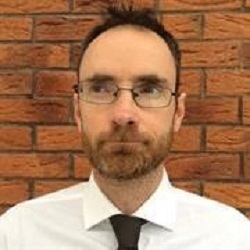Dr Lawrence Amy, Lecturer and Assistant Professor, UCD School of Earth Sciences

What is your research about?
Broadly, it’s about understanding sediment transport processes that make planetary surfaces so dynamic and, over time, form the layers of rock (stratigraphy) we see in the Earth’s crust. I use a variety of approaches to understand how sediment is moved, including looking at outcrops and modern systems, physical laboratory models and mathematical/computational modelling. Some of this research includes studying the largest sediment transport events on the planet that carry cubic kilometre volumes of sediment over many 100s of kilometres in single avalanche events. The models I work with can also be applied to the understanding of processes on other planetary bodies in our solar system, such as Mars and Titan, where fluids also play an important role in moving sediment and forming landscapes. Applied aspects include better understanding and finding solutions to manage natural hazards such as floods and landslides which pose a risk to communities but also to critical infrastructure (e.g., submarine cables and wind-farm developments), and understanding the location, geometry and properties of subsurface reservoirs (e.g., for CO2 and hydrogen storage).
What is your advice for someone interested in studying geology?
If you’re interested in nature, the way the planet works and like spending time in the great outdoors, consider studying Earth Sciences / Geology. The (opens in a new window)Geological Survey of Ireland and the (opens in a new window)Geological Society of London have useful webpages describing what geoscience is about and potential careers. A geoscience-related degree provides students with problem-solving skills and an aptitude for flexibility, lateral thinking and dealing with uncertainty. These transferrable skills are highly valued in many sectors, so there are lots of opportunities to go into different types of work not just geoscience.